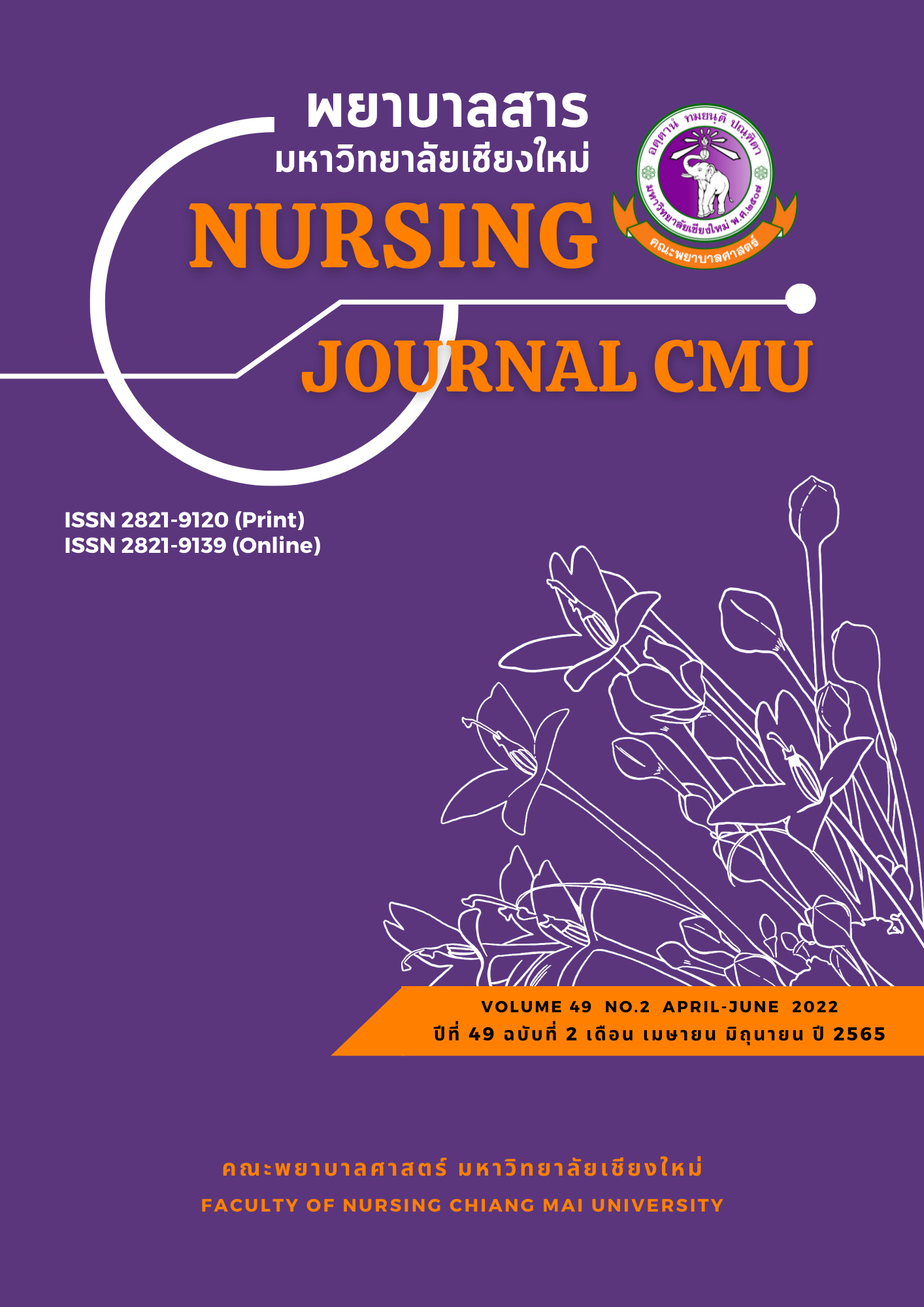ผลของโปรแกรมการส่งเสริมการตรวจเต้านมด้วยตนเองผ่านอีเลิร์นนิงต่อความรู้และการปฏิบัติการตรวจ เต้านมด้วยตนเองของบุคลากรสุขภาพสตรีงานการพยาบาลผู้ป่วยนอกและผู้ป่วยฉุกเฉิน
คำสำคัญ:
การตรวจเต้านมด้วยตนเอง, การปฏิบัติการตรวจเต้านมด้วยตนเอง, ความรู้ในการตรวจเต้านมด้วยตนเอง, บุคลากรสุขภาพสตรี, โปรแกรมการส่งเสริมการตรวจเต้านม, มะเร็งเต้านม, อีเลิร์นนิงบทคัดย่อ
มะเร็งเต้านมยังคงเป็นปัญหาสุขภาพที่สำคัญของสตรีทุกคน ทั้งที่มีนโยบายระดับประเทศในเรื่องการส่งเสริมการตรวจเต้านมด้วยตนเองในสตรี แต่ยังพบว่าอัตราการเข้ารับการคัดกรองและรักษามะเร็งเต้านมในระยะที่มีอาการรุนแรงแล้วยังสูงมาก ดังนั้นการส่งเสริมให้สตรีสามารถตรวจเต้านมด้วยตนเองจึงมีความสำคัญมาก การศึกษากึ่งทดลองครั้งนี้ มีวัตถุประสงค์เพื่อศึกษาผลของโปรแกรมการส่งเสริมการตรวจเต้านมด้วยตนเองผ่าน อีเลิร์นนิงต่อความรู้ และการปฏิบัติการตรวจเต้านมด้วยตนเองของกลุ่มบุคลากรสุขภาพสตรี กลุ่มตัวอย่าง ได้แก่ กลุ่มบุคลากรสุขภาพสตรี โรงพยาบาลมหาราชนครเชียงใหม่ จำนวน 28 คน เครื่องมือที่ใช้ในการศึกษาได้แก่ โปรแกรมการส่งเสริมการตรวจเต้านมด้วยตนเองผ่านอีเลิร์นนิง แบบสอบถามข้อมูลทั่วไปของกลุ่มตัวอย่าง แบบวัดความรู้เรื่องมะเร็งเต้านม แบบวัดความรู้เรื่องการตรวจเต้านมด้วยตนเอง ซึ่งมีค่าความเชื่อมั่นของเครื่องมือเท่ากับ .81 และ .72 ตามลำดับ และแบบสังเกตการปฏิบัติการตรวจเต้านมด้วยตนเอง มีค่าความเชื่อมั่นโดยการหาความตรงกันระหว่างผู้วิจัยและผู้เชี่ยวชาญ (interrater) เท่ากับ 1 วิเคราะห์ข้อมูลโดยใช้สถิติเชิงพรรณนา และสถิติ Pair t test และ Fisher’s exact test
ผลการวิจัยพบว่า ภายหลังเข้าร่วมโปรแกรมฯกลุ่มตัวอย่างมีระดับความรู้เรื่องมะเร็งเต้านม และการตรวจเต้านมด้วยตนเองเพิ่มขึ้นกว่าก่อนการเข้าร่วมโปรแกรมฯอย่างมีนัยสำคัญทางสถิติ (p < .001 และ p = .015 ตามลำดับ) และก่อนการเข้าร่วมโปรแกรมฯ กลุ่มตัวอย่างทุกคนปฏิบัติการตรวจเต้านมด้วยตนเองไม่ถูกต้อง แต่หลังจากเข้าร่วมโปรแกรมฯ กลุ่มตัวอย่างมีความสามารถในการปฏิบัติการตรวจเต้านมด้วยตนเองถูกต้องเพิ่มขึ้น อย่างมีนัยสำคัญทางสถิติ (p <. 001)
ผลการศึกษานี้แสดงให้เห็นว่า โปรแกรมการส่งเสริมการตรวจเต้านมด้วยตนเองผ่านอีเลิร์นนิงนี้สามารถเพิ่มความรู้และการปฏิบัติของกลุ่มบุคลากรสุขภาพสตรีเกี่ยวกับการตรวจเต้านมด้วยตนเอง ดังนั้นจึงควรนำไปใช้ส่งเสริมให้สตรีมีการตรวจเต้านมด้วยตนเองเพื่อค้นหามะเร็งเต้านมตั้งแต่เริ่มแรก
เอกสารอ้างอิง
Burns, N., & Grove, S. K. (2010). The practice of nursing research, conduct, critique, and utilization (8th). Philadelphia: Saunders.
Chamnanchang, S., Priyatruk, P., & Moopayak, K. (2014). Factors associated with breast self-examination behaviors among women workers. Journal of Nursing Science, 32(3), 42-51. (in Thai)
Chutiraka, S., Perngmark, P., & Chukumnerd, P. (2020). Development of yoga program for spiritual well-being for breast cancer patients receiving chemotherapy. Songklanagarind Journal of Nursing, 40(4), 37-47. (in Thai)
Kritpreedaborisut, B. (2006). Statistical analysis for research. Retrieved from http://library2.tni.ac.th/ulib/dublin.php?ID=13079#.YciEJmhBxPY
Laohajaratsang, T. (2018). Designing effective pedagogical approaches with next-generation LMS for students in higher education. THAITESOL Journal, 31(1), 1-20. (in Thai)
Manasatchakun, P., Khueansombat, T., & Worawon, C. (2021). Learning experience of nursing students through conduction complement e-learning in Gerontological Nursing Course. Journal of MCU Nakhondhat, 8(2), 225-39. (in Thai)
Mernkratok, S., Polnigongit, W., & Rakasasuk, N. (2020). The effectiveness of using e-Learning in pre-cooperative education course, Suranaree University of Technology. Electronic Journal of Open and Distance Innovative Learning, 10(2), 73-87. (in Thai)
National Cancer Institute. (2019). National cancer institute strategic plan 2019 – 2022. Retrieved from https://www.nci.go.th/th/Today/download/Pdf
National Cancer Institute. (2020). Hospital cancer registration 2020. Retrieved from https://www.nci.go.th/e_book/hosbased_2563/index.html.
Namprom, S. (2019). ELearning methods: Online teaching and learning method. Retrieved from https://reder.red/elearning-method-26-03-2020/
Paiboon, M., Chardee, K., Lekawanvised, S., Pongpakatip, S., & Aphinives, P. (2013). Promotion of breast self-examination behavior among female personnels of the outpatient department, Srinagarind Hospital. Srinagarind Medical Journal, 28(1),115-9. (in Thai)
Pongthavornkamol, K., Watthayu, N., & Khuhaprema, T. (2019). Breast cancer prevention and screening system in Thailand in health practitioners' perspectives. Thai Cancer Journal, 39(3), 77-92. (in Thai)
Pradubwate, R. (2017). Technology learning management guidelines by using Bloom's taxonomy. Veridian E-Journal, Silpakorn University, 10(3), 1051-1065. (in Thai)
Proctor, E., Silmere, H., Raghavan, R., Hovmand, P., Aarons, G., Bunger, A., … Hensley, M. (2011). Outcomes for implementation research: Conceptual distinctions, measurement challenges, and research agenda. Retrieved from https://link.springer.com/article/10.1007%2Fs10488-010-0319-7
Sakcharoen, P. (2015). Adult learning theory and self-directed learning concept: Learning process for promoting lifelong learning. Journal of the Royal Thai Army Nurses, 16(1),8-13. (in Thai)
Srisoy, A., & Akkarasetsakul, A. (2020). The comparative study on the effectiveness of media between brochures and video for teaching mastectomy patients at Department of Female Surgery, UdonThani Hospital. Udonthani Hospital Medical Journal, 28(2),203-11. (in Thai)
Thammatha, T. (2014). E-learning: From theory to practice. Retrieved from http://support.thaicyberu.go.th/research/e-Learning_Book.pdf
Thongbai, P., & Saengchaiyaphum, A. (2014). Situation of breast self-examination in women personnel aged 30 to 60 years at Rayong Hospital. Retrieved from http://www.rayonghospital.net/sites/default/files/fileupload/Situation Of Breast Self-Examination.pdf
Thotong, R., Somharnwong, S., Sangrajrang, S., Pichainarong, N., Satitvipawee, P., Pitikultang, S., & Chaveepojnkamjorn, W. (2019). Factors related to breast self-examination practices among premenopausal women. Thai Cancer Journal, 39(1), 16-27. (in Thai)
Trakulram, S., & Tritipsombut, J. (2019). Effects of promoting breast self-examination programme on women in Hindat Sub-district, Dankhunthot District, Nakhon Ratchasima Province. Journal of Council of Community Public Health, 1(1), 41-52. (in Thai)
Vichean, U., Aukhapatsakun, P., & Srichanchai, U. (2019). E-learning lesson model for students through the network. Business Review Journal, 11(1), 231-42. (in Thai)
Wongjunlongsin, S., & Sumdaengrit, B. (2019). Causes of delayed seeking treatment in Thai women with breast cancer in Ramathibodi Hospital. Journal of Nursing and Health Care, 37(3), 201-210. (in Thai)
Yonphan, P., Kaveevivitchai, C., & Neelapaichit, N. (2016). Computer-mediated multimedia breast self-examination programme for vocational students. Thai Journal of Nursing Council, 31(4), 91-103. (in Thai)
ดาวน์โหลด
เผยแพร่แล้ว
รูปแบบการอ้างอิง
ฉบับ
ประเภทบทความ
สัญญาอนุญาต
ลิขสิทธิ์ (c) 2022 พยาบาลสาร

อนุญาตภายใต้เงื่อนไข Creative Commons Attribution-NonCommercial-NoDerivatives 4.0 International License.
บทความที่ได้รับการตีพิมพ์เป็นลิขสิทธิ์ของวารสารพยาบาลสาร
ข้อความที่ปรากฏในบทความแต่ละเรื่องในวารสารวิชาการเล่มนี้เป็นความคิดเห็นส่วนตัวของผู้เขียนแต่ละท่านไม่เกี่ยวข้องกับมหาวิทยาลัยเชียงใหม่ และคณาจารย์ท่านอื่นๆในมหาวิทยาลัยฯ แต่อย่างใด ความรับผิดชอบองค์ประกอบทั้งหมดของบทความแต่ละเรื่องเป็นของผู้เขียนแต่ละท่าน หากมีความผิดพลาดใด ๆ ผู้เขียนแต่ละท่านจะรับผิดชอบบทความของตนเองแต่ผู้เดียว






